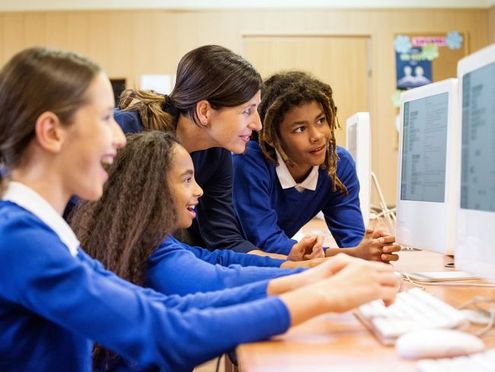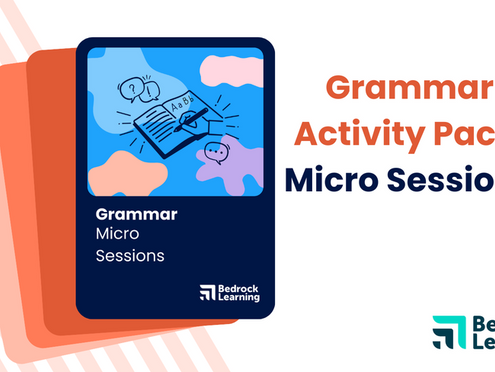How literacy improvement enhances learners’ outcomes
The OUP 2020 Oxford Language Report, Bridging the Word Gap at Transition, highlighted the importance of improving academic vocabulary, especially during the transition from primary to secondary school.
In this webinar, two experienced educators share their opinions and insights into:
- Manageable, meaningful and sustainable strategies to improve literacy and improve outcomes
- How to ensure staff buy-in and encourage their use of data
- Implementing Bedrock and its influences on learner attainment, as well as self-esteem, wellbeing, behaviour
- Why improving language has such a huge impact on learner outcomes
Our inspirational educators share how they have created language-rich communities at their respective schools and how celebrating reading, writing and oracy improves outcomes for all.
Alongside Bedrock’s Alex Randle, Head of Engagement and former English teacher and GCSE examiner, was Daisy Woolloff, who works in the English department at Harris Academy Beckenham. She oversees Bedrock across her school.
“92% of teachers think school closures have contributed to a widening of the word gap.” - OUP, 2020

How did you find the impact of lockdown when students returned to your school?
Daisy: When learners came back, it was more the mental health side that I noticed in my classroom – the anxiety that accumulated in some students more than I could have expected. That lent itself to learners not engaging, either verbally or in writing.
There was quite a lot of withdrawal during the lessons. Looking at the work that learners were producing, there was regression across the board.
Do you think communications reminding people of catch-ups and how far learners are behind would be useful?
Daisy: We had some specific training before learners came back to school about the language to use with them. It is about positive reinforcement, being positive about what we can achieve, moving forward. We avoid unhelpful comparisons with last year, pre-COVID.
Have you noticed any impact on the success of Year 7 when they come in?
Daisy: Yes, 100%. I think it stands for itself with the work that has been produced. It is also interesting during the training when we look at the work between Year 6 and Year 7, which highlights a matter of concern. Our job is essentially to support them, to help them hold onto their knowledge while adding more.
Alex: Recently, I did some training with Alex Quiqley, who attributed poor behaviour to being a coping mechanism, a response to an inability to express. When we had Ellie Ashton on the panel for our last webinar, she said that teachers associate learners who have low literacy levels with those behaviours.
Daisy: I think [a lack of literacy skills] results in increased frustration, hence poor behaviour – this becomes a vicious cycle.
What strategies do you use that are manageable, meaningful and sustainable to improve literacy and why?
Daisy: I am very lucky that the English team at Beckenham are dedicated to making Bedrock work for our learners. Every lesson starts with a new word being taught explicitly. We then look at it during a set of reading and incorporate it into writing later on.
We check the Bedrock app to ensure we know which words certain learners are struggling with, such as PP (Pupil Premium) learners or SEN (Special Educational Needs) learners, then teach that word to the whole class. This ensures that progress of the whole class is not limited, while learners with special needs receive an additional nudge in the right direction.
Other things that I have gathered from my team are:
- Have the same Bedrock hand-in date.
- Celebrate learners’ achievements.
- Hold competitions, and have a class leaderboard which is presented in assembly every week.
- Send postcards home to recognise learners who have made the most progress, spent the most time or achieved the most points during a time period.
How have you been encouraging staff to be positive, motivated and empowered to use the data?
Daisy: In September 2020, we looked at the data over the lockdown period – how much catch-up learners needed, how much time had been lost and how much progress could have been made. This was not the reality we’d like our students to experience.
The context of the 2020-21 year was different. It’s more important than ever that learners exceed the expected progress. There are weekly reminders during staff meetings about why we’re doing this, then we relate that to our school’s specific context through the reports from Bedrock.
This is also included in assembly, which makes it clear that Bedrock is now a part of our culture here.
Alex: Back when I was in the classroom, I championed oracy and speaking out loud before setting things down on paper. I also put students into the Jack Petchey Award and Poetry Slam competitions all the time, which learners loved.
What impact has implementing Bedrock had on attainment, self-esteem, wellbeing and behaviour?
Daisy: These factors are intertwined. In terms of attainment, it stands in the writing that learners have been producing; there’s been an improvement in both academic and creative writing. It’s been clear through reading engagement that our reading culture has also been enhanced this year, i.e. a willingness to read widely.
In terms of self-esteem and wellbeing, this provides learners with the tools to articulate themselves and identify their emotions internally. Leaderboards have been of great use in offering learners the motivation, pride, confidence, and potentially aspiration, which might not occur for many learners outside of the classroom context.
Why do you think improving language has such a huge impact on learner outcomes?
Daisy: “Learner outcomes” is a broad term – it’s no longer limited to academic success. It’s about working with literacy teams, pastoral leads and behaviour management, and having contact with parents at home. These are all important for building the pastor around academics. Bedrock has given us a way to keep regular and purposeful contact with home. It is no longer just about poor behaviour; it can be focused on learners’ success through productive conversations.
Alex: Coming back to the term “literacy”, you’ve got cultural literacy, critical literacy and emotional literacy. All of these are important within the exam setting, as general knowledge of the world is increasingly valued and needed within society.
How have you been using Bedrock to increase parental involvement in literacy improvement?
Daisy: We’ve done a variety of things:
- At the start of the year, we contacted all parents with their access codes and student logins.
- We’ve kept parents informed when their child hasn’t made the expected progress.
- We’ve offered recognition when learners surpass expectations.
This also applies in the classroom – learners enjoy reinforcement from others. This contributes to a better atmosphere and culture towards Bedrock in the long term.
During the half-term holiday, we’ve instilled it through contacting parents with a quick reminder. We’ve noticed that parents have been more proactive when contacting us about homework, instead of us reaching out to them all the time.
It’s been a positive thing for us to be able to keep in contact with our parents outside parents’ evenings. This has made the whole teaching and learning experience with students much healthier and happier.
3 top tips to support literacy outcomes in your school
- Adopt a Bedrock Learning routine to support teaching and learning across the school
- Praise, encourage and intervene in learners’ attainment on a frequent, personalised basis
- Maintain close contact with parents




